News, October 2011
www.aljazeerah.info
Archives
Mission & Name
Conflict Terminology
Editorials
Gaza Holocaust
Gulf War
Isdood
Islam
News
News Photos
Opinion Editorials
US Foreign Policy (Dr. El-Najjar's Articles)
|
Editorial Note: The following news reports are summaries from original sources. They may also include corrections of Arabic names and political terminology. Comments are in parentheses. |
Yemeni Protesters March to New Areas in Sana'a, Exerting More Pressure on Dictator Saleh
October 6, 2011
Editor's Note:
The Yemeni revolution is the least covered in the media despite the fact that Yemenis have suffered almost nine long months of protests against the dictator.
The corporate media have ignored the brave Yemeni revolutionaries and their sacrifices because Yemen does not have oil and away from Israel.
Moreover, the dictatorial regime played Al-Qaeda card, that it is defending the US against the fictitious organization, which does not exist except in the minds of those who want to maintain their jobs.
***
Protesters challenge red lines
Sadeq Al-Wesabi
Yemen Times, 03-10-2011
SANA’A, Oct. 2—
Tens of thousands of pro-democracy protesters in Sana’a held a
massive demonstration last Sunday, demanding the departure of the regime
and trial of President Ali Abdullah Saleh.
The demonstrators also
strongly condemned the ‘inflammatory fatwa’ issued by some of Saleh’s
clerics to prohibit the protests against the leader. The demonstrators
considered this fatwa a declaration of war and a justification for the
regime to kill more protesters.
The march passed through new
areas in which many pro-regime soldiers have been deployed. Many
protesters greeted the soldiers of Republican Guard and Central
Security. The demonstration was staged amid a political standoff.
President Saleh still refuses to sign the Gulf initiative that grants
him immunity from prosecution.
However, the revolutionaries vowed
to escalate their actions and hold demonstrations in new areas of the
capital, in which snipers are reportedly deployed in the rooftops of
many buildings.
One protester, Mohammed Al-Emad, said that
although the protesters passed through dangerous areas there were no new
attacks Sunday. “We crossed the red lines for the first time. It’s our
escalation plan to cross new places to reach new districts in Sana’a.”
Al-Emad indicated that the revolutionaries plan to intensify their
demonstrations until the regime leaves office.
Mohammed Saeed, a
youth activist and anti-regime protester, said that the demonstration
was exceptional.
“Our demonstration was not obstructed by the
security and was not assaulted by thugs and snipers as usual. The regime
is now deploying its heavy security and snipers on the roads leading to
the presidential palace only,” said Saeed.
“We aimed in this
well-planned demonstration to raise awareness of the importance of
people’s participation in the revolution in different areas of Yemen,”
he said. “Many people from different districts joined Sunday’s
demonstration enthusiastically and chanted against the regime.”
Saeed said that the announcement of the demonstration was sudden. He
noted that the next rallies will also be announced on short notice to
confuse the regime. According to Saeed, the revolutionaries will
continue to escalate their actions over the next two weeks.
“If
UN envoy Bin Omar doesn’t secure a political solution we will hold
rallies in the ways into the presidential palace,” said Saeed.
“Unfortunately, the regime keeps on providing justifications for
avoiding a political agreement,” he said. “The regime wants to ignite a
civil war. Some of the regime’s officials think they will defeat the
revolutionaries. They don’t know that it’s impossible to defeat all
Yemenis.”
Although the tensions between defected army units and
the Republican Guards have not exploded militarily, intermittent clashes
renewed on Saturday night at Hail and 16th Streets, one of the entry
points to Change Square where the anti-government sit-ins are focused.
“Last night the Republican Guards fired two RPG blasts into Hail and
16th Streets to discover how many of the First Armored Division [the
defected army] are in the area,” said Adnan Al-Rajhi who was present
when the fighting erupted. “The Division replied using medium-size
weapons,” he said.
===================
Friday, May 13, 2011 protest in Sana'a
Government agents fire at protesters, May 12, 2011
Government agents fire at protesters in Ta'ez, August 9, 2011
The Ta'ez massacre, committed by government forces against protesters, September 15, 2011.
May 9, 2011
Sana'a stadium massacre, April 27, 2011
Revolution rally in Ebb, April 27, 2011
Tearing down the dictator's poster in Al-Hudayda, April 11, 2011
April 11, 2011 protests
Protests and songs
Protests and songs
Government snipers fire at protesters in Sana'a, April 6, 2011.
A rapper and protesters sing, "The People Want Throwing Out the Regime." April 3, 2011.
======================
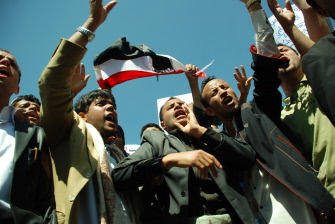 |
|
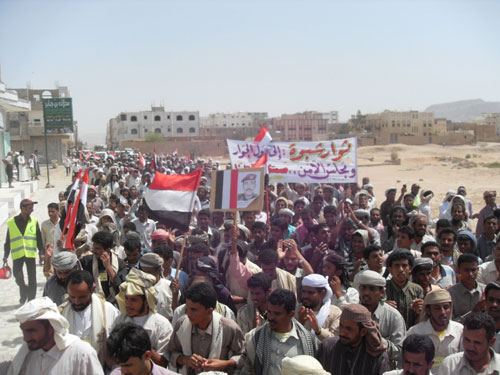 |
|
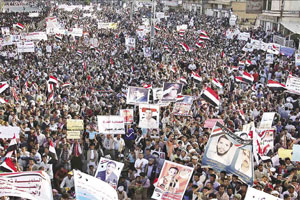 |
|
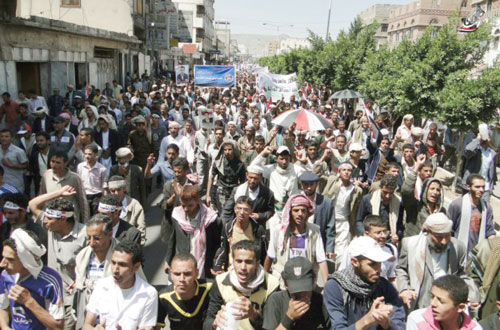 |
The revolutionaries vowed to escalate their actions and hold demonstrations in new areas of the capital. Photo by Mohammed Al-Emad
Protesters challenge red lines
Sadeq Al-Wesabi
Yemen Times, 03-10-2011
SANA’A, Oct. 2—
Tens of thousands of pro-democracy protesters in Sana’a held a
massive demonstration last Sunday, demanding the departure of the regime
and trial of President Ali Abdullah Saleh.
The demonstrators also
strongly condemned the ‘inflammatory fatwa’ issued by some of Saleh’s
clerics to prohibit the protests against the leader. The demonstrators
considered this fatwa a declaration of war and a justification for the
regime to kill more protesters.
The march passed through new
areas in which many pro-regime soldiers have been deployed. Many
protesters greeted the soldiers of Republican Guard and Central
Security. The demonstration was staged amid a political standoff.
President Saleh still refuses to sign the Gulf initiative that grants
him immunity from prosecution.
However, the revolutionaries vowed
to escalate their actions and hold demonstrations in new areas of the
capital, in which snipers are reportedly deployed in the rooftops of
many buildings.
One protester, Mohammed Al-Emad, said that
although the protesters passed through dangerous areas there were no new
attacks Sunday. “We crossed the red lines for the first time. It’s our
escalation plan to cross new places to reach new districts in Sana’a.”
Al-Emad indicated that the revolutionaries plan to intensify their
demonstrations until the regime leaves office.
Mohammed Saeed, a
youth activist and anti-regime protester, said that the demonstration
was exceptional.
“Our demonstration was not obstructed by the
security and was not assaulted by thugs and snipers as usual. The regime
is now deploying its heavy security and snipers on the roads leading to
the presidential palace only,” said Saeed.
“We aimed in this
well-planned demonstration to raise awareness of the importance of
people’s participation in the revolution in different areas of Yemen,”
he said. “Many people from different districts joined Sunday’s
demonstration enthusiastically and chanted against the regime.”
Saeed said that the announcement of the demonstration was sudden. He
noted that the next rallies will also be announced on short notice to
confuse the regime. According to Saeed, the revolutionaries will
continue to escalate their actions over the next two weeks.
“If
UN envoy Bin Omar doesn’t secure a political solution we will hold
rallies in the ways into the presidential palace,” said Saeed.
“Unfortunately, the regime keeps on providing justifications for
avoiding a political agreement,” he said. “The regime wants to ignite a
civil war. Some of the regime’s officials think they will defeat the
revolutionaries. They don’t know that it’s impossible to defeat all
Yemenis.”
Although the tensions between defected army units and
the Republican Guards have not exploded militarily, intermittent clashes
renewed on Saturday night at Hail and 16th Streets, one of the entry
points to Change Square where the anti-government sit-ins are focused.
“Last night the Republican Guards fired two RPG blasts into Hail and
16th Streets to discover how many of the First Armored Division [the
defected army] are in the area,” said Adnan Al-Rajhi who was present
when the fighting erupted. “The Division replied using medium-size
weapons,” he said.
Anti-regime demonstrations increase amid political deadlock
Sadeq Al-Wesabi
Yemen Times, 29-09-2011
SANA’A, Sept. 28 —
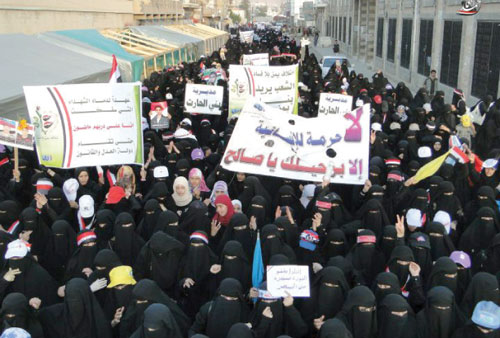 |
Tens of thousands of pro-democracy Yemenis held two mass
demonstrations last Wednesday in Sana’a demanding that Saleh step down.
They called also for President’s trial.
Male revolutionaries
staged their demonstration in the morning while the female held their
rally in the evening. The female protesters demanded that president
Saleh step down and condemned the violence acts against the peaceful
protesters. Their demonstration was heavily guarded by the dissident 1st
Armored Division.
The female demonstrators chanted, “Female
revolutionaries have the right to protest”, “O international community
look at terrorism… Ali [president] kills the youth”, “Resolving the
revolution is our demand… and weapon won’t terrorize us”. They also
raised slogans saying, “People want to build a new Yemen,”
During
the last week, tens of pro-democracy protesters were killed and
thousands wounded by Saleh’s security. However, the crackdown against
the protesters has increased their determination to overthrow the
regime. They vowed to escalate their actions and hold daily rallies
against the regime.
Fakhr Al-Azab, spokesman of the Organizing
Committee of the Youth Revolution told the Yemen Times that the recent
rallies were held as a program of escalation that aims to overthrow the
regime.
He highly praised the determination of the
revolutionaries, expressing his admiration for the female
revolutionaries who “made an effective and vital contribution towards
the revolution.”
“We demanded during the rallies the trial of
President Saleh with his inner circle for their crimes against peaceful
protesters,” he said.
The demonstrators also called for the
international community to adopt a clear stance on the revolution.
“We called on the international community to hear us carefully. They
should respect our aspiration for the change,” said Al-Azab. “Our
demands are perfectly legitimate. We seek justice, freedom and building
a new civil state. We want to assure the international community that
Yemen and regional security will be safer after Saleh’s departure. We
plan to build a strong relations with other countries based on
cooperation and mutual interests,”
Youth activist Sabah Badri Bakir speaks to Yemen Times
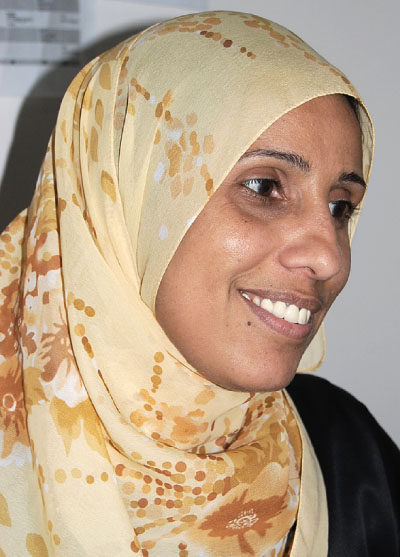 |
Yemen’s youth have great values and different thoughts
Sabah Badri Bakir YT photo by Sadeq Al-Wesabi
Sadeq Al-Wesabi
Yemen Times, 22-09-2011
Sabah Badri Bakir is a struggling youth activist who has
dedicated herself to the development of youth in Yemen. She is widely
admired for her valuable contribution towards the Yemeni youth.
Many Yemeni youth have been trained by her. Thus, some of them describe
her as a mother of many Yemeni children.
Since her childhood,
Sabah was a very active and eager to be a volunteer. She was working
hard and enthusiastically and she didn’t care about financial returns at
all. “Volunteerism in Yemen is misunderstood. For me, Volunteerism means
how to invest your time and your efforts well without any return.”
Sabah has a different vision of how Yemeni NGOs should work. She is
dissatisfied with the current performance of Yemen’s NGOs that, “Put
their interest above public interest,” she said.
“Unfortunately,
cooperation and coordination between Yemeni NGOs is very weak,” she
added.
She is also known for her developmental philosophy.
“Development doesn’t mean building schools or hospitals. Development
means creating chances for people,” she said.
For over ten years,
Sabah has been working for several reputable organizations, foundations,
and initiatives.
Her expertise is in youth programming,
participatory planning with youth, capacity building, civil society
strengthening, community mobilization, and training.
She has
worked with mainstream youth and with youth with disabilities as a
professional and as a volunteer, with the aim of empowering them and
making their voices heard. She has also worked in the field of conflict
management during the war of secession in 1994.
In 2004, she was
the office manager of the Commission of Scouting in Yemen. She took the
lead in re-organizing scouting as it was implemented in Yemen and
managed to get much more girls involved in scouting activities. She was
also responsible in organizing an annual summer camps for scouts and
others all over the country.
She was also able to generate a
range of extra resources for youth to support the Siraj Youth
Empowerment Program in Yemen.
However, Sabah hasn’t always had
good experiences in her work. “During my work in many organizations, I
was fully exploited instead of being invested well,” she said.
However, Sabah isn’t depressed about her experience. “Although I was
exploited I still gained skills and knowledge from these experiences.”
Earlier this year, she became an executive manager of the
newly-established For All Foundation.
“I aspire, through this
foundation, to change the life of many Yemeni youths for the better,”
said Sabah.
One of the recent positions given to Sabah is the
office manager of the Ministry of Sports and Youth. She was directly
reporting to the Minster of Youth and Sports where she took the lead in
the setting up and strengthening the office into a ministry that now has
an important function in the government.
Sabah criticized Yemeni
NGOs that depend totally on international donations, stressing the
importance of Yemen’s private sector contribution towards the Yemeni
NGOs.
She indicated that some beneficiaries of international
donation have become dependent on the funding. “Some IDPs in Haradh
camps, Hajja Governorate, are completely dependent upon international
donations. They don’t depend on themselves even in simple things that
don’t need help such as re-erecting their tents.”
“We should
provide those IDPs with useful projects that help them for the rest of
their life,” said Sabah.
Presently, Sabah is fully occupied with
a new challenging project. She is gearing up for a seven-month project
that aims to qualify 140 young people from war-torn Abyan Governorate to
be able to start their own businesses. “Yemeni youth have great skills
but need support and encouragement,”
According to Sabah, there
are many Yemeni organizations that work without offices and some
founders of such organizations hold stamps and all documents of their
foundations in their briefcases. “We have many fake organizations and
foundations that have licenses from the Ministry of Labor and Social
Affairs but have no any activity or any active programs.”
“All
organizations and foundations in Yemen must be under careful and serious
observation,” she added.
“Yemen’s youth are very enthusiastic
about development and have intellectual abilities to change into better
but they didn’t find the organization or the foundation that support
them and make their voices heard. Our youth have great values and
different thoughts,” she said, praising the ability of Yemeni youth.
Anas Al-Kherbi, a youth activist and one of the Sabah’s trainees,
talked about Sabah, saying, “Sabah has changed my character. She has
taught me how to be effective in changing my community.”
“She
gave me a new perspective on life and she has expanded my horizons. She
is really the mother of Yemeni youth,” said Al-Kherbi.
Fair Use Notice
This site contains copyrighted material the use of which has not always been specifically authorized by the copyright owner. We are making such material available in our efforts to advance understanding of environmental, political, human rights, economic, democracy, scientific, and social justice issues, etc. We believe this constitutes a 'fair use' of any such copyrighted material as provided for in section 107 of the US Copyright Law. In accordance with Title 17 U.S.C. Section 107, the material on this site is distributed without profit to those who have expressed a prior interest in receiving the included information for research and educational purposes. For more information go to: http://www.law.cornell.edu/uscode/17/107.shtml. If you wish to use copyrighted material from this site for purposes of your own that go beyond 'fair use', you must obtain permission from the copyright owner.
|
|
|
|
||
|
||||||


